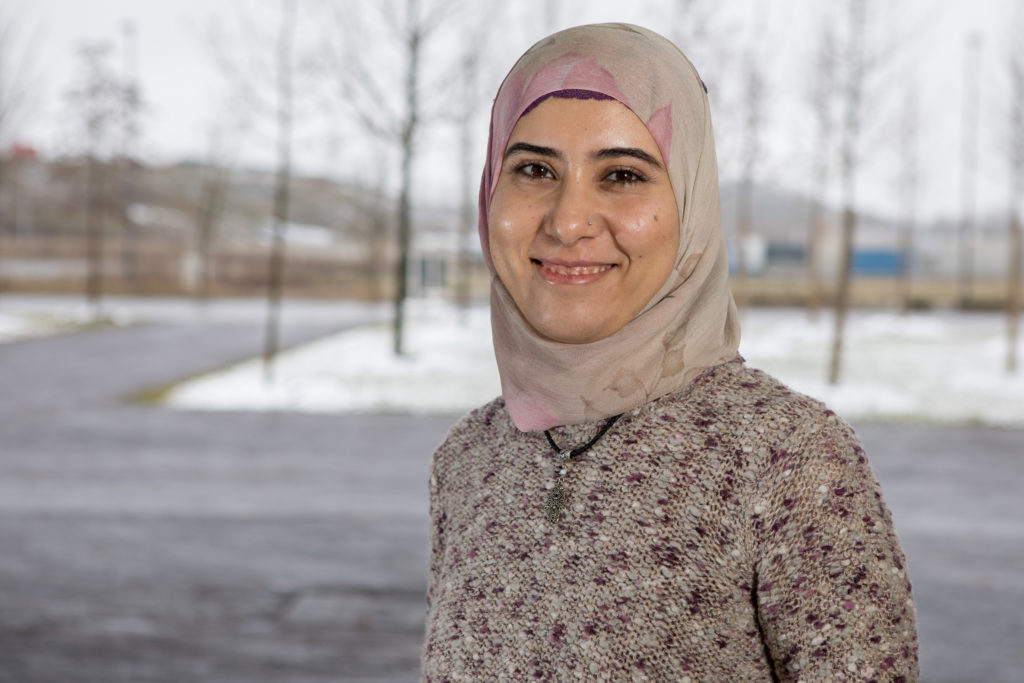Gender Equity

We sat down with Dr. Abualhaija to ask her about her path to ICT and the challenges that she encountered in her career as a woman in tech.
Dr. Sallam Abualhaija is a research scientist in the Software Verification and Validation (SVV) research group at SnT. Her field of research is artificial intelligence for software engineering, with specific interests in natural language processing, text mining, machine learning, requirements engineering, as well as legal and regulatory compliance.
What inspired you to pursue a career in tech?
I grew up with computers – my family owned a Commodore 64 in the 80s that I used to play with. I always liked gaming, and made a tremendous effort to win against the computer agents.
However, when the time came to choose my path after high school, I had really mixed interests, including music, languages, math and computer science. I opted for computer science as my first choice mostly due to its favourable career perspectives.
It was when I started learning about artificial intelligence (AI) and natural language processing (NLP) that I became fascinated with the new, exciting possibilities of combining computer science with my interest in languages. I find amazing how technology can help people communicate across languages, for example with automated translation.
What do you work on today?
My research Involves using AI technologies like GPT (the language model at the base of ChatGPT) to automatically analyse and understand text in diverse contexts.
In particular, by using AI to analyse written requirements for software development to spot ambiguous words, multiple interpretations, and more, my research focuses on ensuring that the software we use respects our privacy, is compliant with regulations like GDPR, and is developed following precise instructions. By determining the exact meaning of software requirements before applications are built, my research aims to minimise the likelihood of making errors in development, which can have life-threatening consequences.
What could society do to encourage girls to pursue a career in IT?
This is a difficult question, especially if you consider less fortunate societies. In Jordan, I spent some time working as a computer science teacher in middle schools. In a few instances, I was assigned to teach in villages where, alongside girls who knew how to use a computer very well, I also met underprivileged girls who had never seen one in their lives.
Generally, teachers could introduce challenges and teach children to solve them. For example, we could teach kids to program simple computer games that they could eventually present in dedicated events at the end of their school year. Kids don’t think about a field as being gender dominated – they just want to explore, learn, and have fun. In my opinion, fostering science in schools through fun activities can reduce or even remove the barriers to it.
Who is your role model and why?
I often get this question, so I started asking myself whether we really need role models to encourage girls to get into science. What I believe girls need is rather support. With support, they will feel secure and capable of taking risks and get out of their comfort zone, like for example studying science or moving abroad. Instead of getting into science to become like someone, they will do so because they genuinely like the topics and want to discover more about them.
Of course, over the course of my career, I had the chance to meet female and male figures in my field whom I admire.
What’s a challenge women face in academia?
Academia is an open-minded place and I never felt excluded as a woman. I think the only challenge is that of belonging to a minority.
On a general level though, the challenges are very much dependent on the mentality surrounding women, and the support they get. In Jordan, the majority of women are struggling with overwhelming responsibilities, such as taking care of their own families as well as extended families, working, and improving their qualifications at the same time, be it in academia or elsewhere. I am always amazed at how they manage all that given the very limited social care compared to Europe.
This article was originally published February 2023.

Dr. Abualhaija received her doctorate in computer science in 2016 from Hamburg University of Technology in Germany. Before joining SnT in 2021, she worked as a postdoctoral researcher at L3S research centre in Hanover, Germany, where she focused on social media analysis during crises in collaboration with relief organisations in Germany.